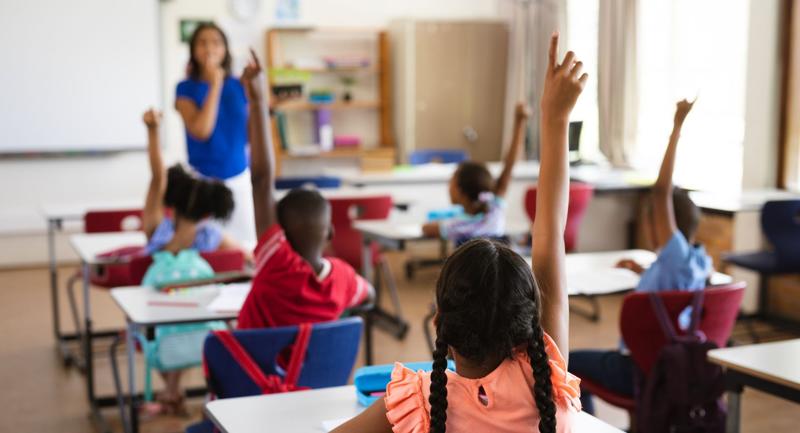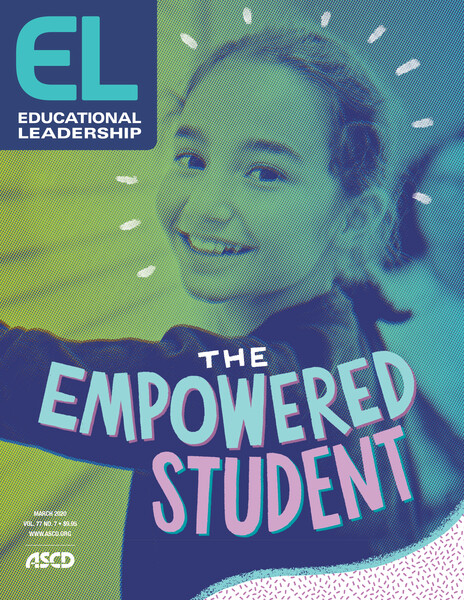The future is unpredictable, says former middle school teacher John Spencer. So "the best way to prepare students for the future is to empower them in the present." An assistant professor of education at George Fox University in Portland, Oregon, Spencer has spent his career advocating for students to be future-ready through design thinking and creativity. He's spoken at the White House Future Ready Summit and delivered a TEDx Talk on the topic. Spencer is the author of several books, including Empower: What Happens When Students Own Their Learning (IMPress, 2017) and Making Learning Flow (Solution Tree, 2017).
Why is student empowerment so important to you as an educator?
Part of it comes down to the school system. In the high-stakes environment we've had with NCLB and standardized testing, there's been a big focus on this passive style of learning. But student empowerment is significant because it leads to deeper learning. It leads to the learning sticking; to a higher retention of knowledge.
The best way to prepare students for the future is to empower them in the present. As we shift into more artificial intelligence and machine learning and prepare for massive disruptions and changes, students are going to have to be nimble, creative, and self-directed. All of that comes from a place of being empowered. For years, we were taught this formula that you work hard at school, you go to a university, and you climb a corporate ladder. But now with all of these changes, the ladder has become a maze. And we're going to have to empower students to navigate that maze.
How does student empowerment factor into the creative thinking process?
The more self-directed students are, the more likely they are to take creative risks. The more likely they are to increase self-efficacy. To own the entire creative process—from asking questions and ideating to revising work and engaging in research—you have to be empowered. Empowerment works in tandem with creativity.
In your writing, you describe "seven shifts" toward student empowerment. Name one essential shift you made as a teacher.
One of the big shifts I made was moving from How do I make this interesting? to tapping into student interests. For example, the Common Core Standards for English/Language Arts are essentially topic neutral. So instead of finding an article I thought was interesting or having the class follow a cool writing prompt that I created, I let students take charge. We still hit every single standard in terms of publishing, research, and writing but they chose the topics. It blew me away how deep they went into their writing.
There was a girl who wrote a beautiful blog post about the politics of hair and being African American. Another girl wrote about what it was like for her mom to be forced to wear a burka in the country that they came from, and then on a bus in America, getting spat on and being called a terrorist for wearing a hijab. By tapping into their interests, students can go deeper. They already have that background knowledge, they're already passionate about the topic, and they have stories connected to it.
How does a fully empowered student learn—and behave—differently?
A fully empowered student is much more self-directed. They initiate things on their own more. They are less fearful. They're going to have all the same struggles that non-empowered students have: they're going to be frustrated, they're going to have times when they don't feel like working, and they're going to have creative blocks that they have to get past. But the key difference is that they keep going. An empowered student tends to be more resilient and have more of a growth mindset. They've had to turn into that productive struggle a little bit more and get past it and succeed.
In my experience, I would say that classroom management tends to be a little easier when students are more self-directed. One reason students misbehave is that they're bored or checked out. Another is that the learning is either too hard for them or too easy. Or they don't feel like they have any control—they're tired of following rules and doing everything the teacher tells them to do. So, if you shift into empowerment, students are self-selecting the scaffolds they need. It's easier for them to match the skill level to their ability level.
How can school leaders create the conditions that empower students?
Empowered teachers empower students. So, school leaders have to start by empowering teachers. And that includes everything from shared leadership that actually involves shared decision making to having choice-based, interest-based professional development. Administrators also have to give teachers the permission to fail forward. If they're asking teachers to take this risk, they have to be able to say, look, there might be a period where student achievement drops and that's OK. Or it might not go perfectly and that's OK. It's not going to hurt your evaluation and we're not going to shame you.
Editor's note: This interview has been edited for space.






